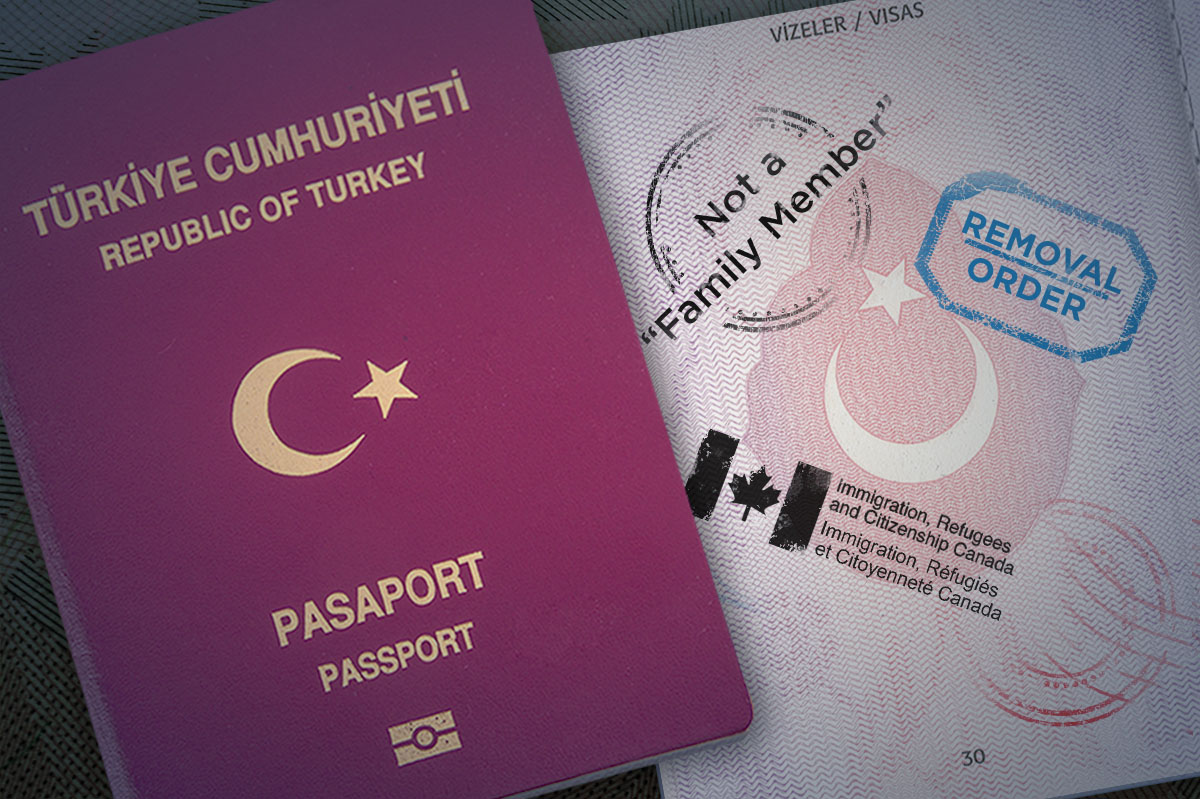An ‘impossible’ choice: Leave 5-year-old son in foster care or risk being tortured

Date posted: November 28, 2021
Nehir Aydin could be forced to make what she calls an “impossible” decision: either leave her five-year-old son alone in Canada, making him a ward of the state, or return to Turkey with him, where she and her family are at risk of persecution because of their religious beliefs.
“I don’t want to think about it,” Aydin said. “He’s so small, he needs protection.”
Aydin and her three children came to Canada in August 2019.
They made refugee claims because they fear they may be arrested, even tortured, by Turkish authorities for belonging to the Hizmet religious movement, a Muslim minority group that Turkish president Recep Tayyip Erdoğan outlawed and blames for a 2016 coup attempt.
The family also fears persecution in Hong Kong, which is where they lived before coming to Canada, because of Beijing’s controversial national security law and the mistreatment of Uyghur Muslims in Mainland China.
An adjudicator at the Immigration and Refugee Board of Canada (IRB) rejected Aydin’s claim and the claims of her two oldest children, saying it’s safe for them to return to Hong Kong. This means Canada could deport them at any time.
But the claim made by Aydin’s five-year-old son was accepted by the IRB because he’s too young for residency in Hong Kong and because his only travel document, an expired Turkish passport, might not be renewed by Turkish officials, who routinely reject applications made by Hizmet followers.
“I’m afraid,” Aydin said. “He can stay, but me and my other two kids, we cannot.”
The adjudicator didn’t dispute Aydin’s claim that she and her children are at risk if they return to Turkey.
“The Turkish state has and is engaging in a widespread campaign targeting known and suspected Hizmet supporters in Turkey and abroad, placing them all at risk of mistreatment by state authorities,” the adjudicator wrote in his decision.
Global News has agreed to use pseudonyms for Aydin and her children because of the risks they face if sent back to Turkey.
Parents are not ‘family members’
Threatening to deport the parents of child refugees — or denying them entry to Canada — is standard practice for Immigration, Refugees and Citizenship Canada.
That’s because a government policy, created in the 1980s, says the parents of children are not “family members” for the purpose of Canadian immigration law. This leaves parents vulnerable to deportation, even after their children are granted refugee protection.
Unlike adults, who can add their spouses, common-law partners and dependent children to applications to remain in Canada permanently, children are barred from adding parents to these applications because only “family members” can be included.
The government said this policy protects children from human traffickers and prevents exploitation because it discourages parents from sending their kids to Canada alone.
But the policy has also been called “cruel” and “inhumane” by lawyers and child rights advocates, including a former UN special rapporteur, who say it’s akin to state-sanctioned family separation.
“It makes no sense,” said Meera Budovitch, a Toronto immigration lawyer who represents Aydin and her family.
Budovitch has filed an application for Aydin and her two oldest children to remain in Canada on “humanitarian and compassionate” grounds.
Prior to the COVID-19 pandemic, these applications, which include any humanitarian reason to stay Canada, were accepted about 60 per cent of the time.
While Budovitch said it’s unlikely the government will deport Aydin when her application is still being processed, the threat of removal and the fear of being separated has caused significant psychological and emotional distress for the family.“If this application is refused, [Aydin] will have to face the difficult decision of either being permanently separated from [her son], or returning to Turkey, where the entire family will be at risk,” Budovitch wrote in a letter sent to Immigration Canada in March.
“Both options will have a devastating impact.”
Policy is ‘inhumane’
This isn’t the first time this policy has been criticized.
A 2018 Global News investigation looked at three cases in which the government either threatened to deport or refused entry to the parents of child refugees.
In one case, the government prevented a teenage boy from reuniting with his parents. The boy came to Canada from Afghanistan in 2016 and was given refugee protection because the Taliban threatened to kill him for participating in a model UN conference.
The other cases involved nine- and 11-year-old girls who the IRB said were at risk of female genital mutilation if sent back to their home countries. Both girls came to Canada in 2016 with their mothers and were granted refugee protection, but their mothers’ claims were rejected.
At least one of the mothers was mutilated as a child.
“There’s very little political momentum to change these policies because, for most of us, it doesn’t affect us,” said François Crépeau, a law professor at McGill University and the former UN special rapporteur on the human rights of migrants.
Crépeau said it’s “ridiculous” that the government would even consider deporting the mother of a five-year-old boy in need of protection.
He also said it’s clear from the government’s actions — the fact that it settles similar cases when challenged in court and that it allows parents to stay on humanitarian grounds when their kids are accepted — that politicians know the policy is wrong and unjustified.
“They wouldn’t even think about it for one second if it was their own family that was at stake,” Crépeau said. “But these are migrants — there’s no pushback.
Global News asked the government to respond to Crépeau’s criticisms, and whether Immigration Minister Marco Mendicino agrees with his remarks.
The government’s response did not address Crépeau’s comments directly, nor did it include anything about the child refugee policy.
Alex Cohen, a spokesperson for Mendicino, said Canada is a “global leader in refugee resettlement,” but said nothing about whether the policy Crépeau criticized harms children and their families.
Policy prevents ‘anchor’ babies
The government insists parents and siblings of child refugees are not “family members.”
A spokesperson for Immigration Canada said its definition of a family member is based on “economic dependency.” Since parents are “de facto” not economically dependent upon their children, they’re not considered family members.
“The definition of family member is based on a concept of dependency,” said Isabelle Dubois in a written statement.
Dubois defended this definition of “family member,” saying it protects children from human trafficking and discourages parents from sending their kids to Canada alone.
“We must provide safeguards against the potential exploitation of children,” Dubois said. “Allowing children to include parents on their (residency) application increases this risk as unaccompanied minors are more vulnerable.”
In 2006, a senior government bureaucrat testified in Federal Court that the policy that bars children from adding parents to residency applications was created in response to concerns that children could be used as “anchors” or “beachheads” for adults to gain residency in Canada.
But the official also acknowledged that the government had no empirical evidence to support its claim that children were at risk of exploitation or that they were being used by their parents. He said the policy was based on concerns about a small number of cases involving children smuggled into Canada from China several decades earlier.
No evidence to support policy
In 2018, Immigration Canada told Global News it still had no empirical evidence to support the policy.
“We are not aware of any research being conducted or available statistical evidence,” said a government spokesperson at the time.
Global News asked the government if it currently has any evidence to support the policy. Dubois didn’t answer this question directly.
Allowing children to include parents on their applications increases their vulnerability to dangers like trafficking and exploitation, as the child’s application is the only way for the parent to get status in Canada,” she said.
Dubois also said parents of child refugees can submit their own applications to stay in Canada on humanitarian and compassionate grounds if their child’s claim is successful.
“This policy aims to ensure that a child’s best interests and safety are taken into consideration,” Dubois said.
But Budovitch said this two-step process is a waste of time and resources.
She also said not every family can afford the cost of submitting a separate humanitarian application, which can be several hundred pages long and which can require complex legal arguments on top of those already made during the refugee claim process.
Budovitch thinks the government should also distinguish between cases involving unaccompanied minors, which she acknowledges may require additional scrutiny, and those of parents who come to Canada with their children.
“If that’s what they’re concerned about, that kids might be trafficked, … that would obviously no longer be a concern if the family is coming together and making a claim,” she said.
The IRB received roughly 180,000 refugee claims between 2017 and 2020. Of these, 1,611 or a little less than 0.9 per cent were made by children who came to Canada without their parents.
The IRB said that due to the “complexity” of the cases involved, and limitations of its computer software, no information is available on how many children came to Canada with their parents and were granted refugee status when their parents’ claims were rejected.
Aydin, meanwhile, said she’s terrified of what might happen if her application to remain in Canada is rejected.
She can’t go back to Turkey, she said, but she’s also unwilling to leave her son alone.
“It’s very difficult,” Aydin said. “How can I choose?”
Source: Global News Canada , August 10, 2021
Tags: Canada | Child victims of Erdogan's persecution | North America | Persecution of Hizmet by Erdogan | Women victims of Erdogan's persecution |
























